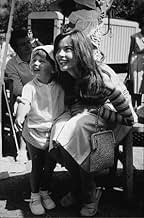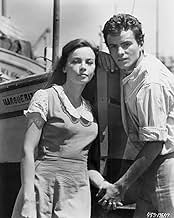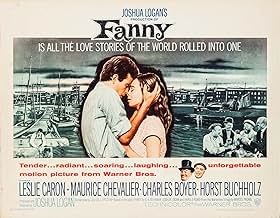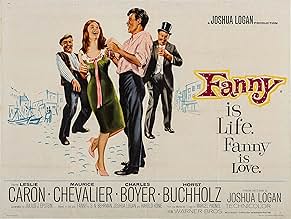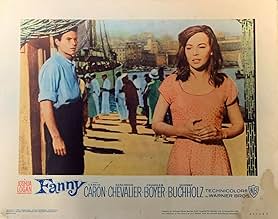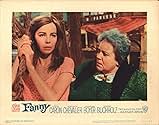Fanny
- 1961
- Tous publics
- 2h 14m
IMDb RATING
6.8/10
2.9K
YOUR RATING
Young Marius dreams of leaving his dull provincial life and seeing the world. When the beautiful Fanny declares her adoration for him, Marius must choose between an adventurous life at sea a... Read allYoung Marius dreams of leaving his dull provincial life and seeing the world. When the beautiful Fanny declares her adoration for him, Marius must choose between an adventurous life at sea and the grandest adventure of all: love.Young Marius dreams of leaving his dull provincial life and seeing the world. When the beautiful Fanny declares her adoration for him, Marius must choose between an adventurous life at sea and the grandest adventure of all: love.
- Nominated for 5 Oscars
- 1 win & 16 nominations total
Salvatore Baccaloni
- Escartifigue (Ferryboat Captain)
- (as Baccaloni)
Raymond Bussières
- The Admiral
- (as Raymond Bussieres)
Joël Flateau
- Cesario (Fanny's Son)
- (as Joel Flateau)
Alan Colegrave
- Dead Licker
- (uncredited)
Dominique Davray
- Woman #1 at Fish Market
- (uncredited)
Germaine Delbat
- Louis Panisse's Wife
- (uncredited)
Featured reviews
10eadoe
I was so glad to see so many reviewers say that this is their favorite movie of all time, because it is mine too -- but I always thought I was the only one who felt this way about it! A large part of my sentimental reaction to this movie comes from the fact that Charles Boyer looked so much like my father did at that age, and this was also the last video my dad and I watched together before he died. When Marius comes out of the café to go to sea, his father is standing on the waterfront watching the ship. There is a stunning fast zoom-in to the back of his father's head that stops my heart, not just because I feel Marius' shock at the realization that he will not see his father again for five years, but also because Boyer looks so much like my own father in that scene. Strangely, when my dad and I watched this together, he caught his breath at this same scene, and said that Boyer looked so much like HIS father!
When Marius says goodnight to his father (Boyer) the night before he plans to run away to sea, there is a beautiful scene in which Boyer is walking up the stairs, then turns and says to his son, "You know, I always tell you that you have ruined my life, but ..." at which point Boyer clutches his chest and becomes so choked up that he can barely continue, and croaks out the line, "it's not true!" It's the most touching, understated scene between a father and son I have ever seen in a movie. (Tragically, Boyer's own son committed suicide four years after this movie was made -- it makes me wonder whether the poignancy of his acting in this scene sprung from his real-life feelings about his own son.)
And who can forget the loving, gentle lecture he gives his son later, when he comes back from sea and wants to take his baby back from Panisse. Boyer tells him that "love is like cigarette smoke -- it doesn't weigh very much -- it takes a lot of love to make 23 pounds" and that Panisse gave the bulk of it to the baby.
And what about Cesar's (Boyer) math skills when he tries to show his son how to make a drink and tells him to use 1/3 each of four ingredients. When his son says, "but a glass only holds three thirds!" Boyer shouts, "It depends on the SIZE of the thirds!"
From start to finish, this film depicts the gentle pathos and kindness of people who all know and love each other (as Marius says, "people who maybe love me too much!"). There are no villains. Even when Panisse (Maurice Chevalier) storms out of the café in a huff, saying that his lifelong friend Cesar (Boyer) has insulted him and that he will never set foot in Cesar's café again -- when someone asks, "What about our card game tonight?" Panisse gives a typically Gallic shrug and replies, "But of course I will be back for that -- what has one thing to do with the other?"
A warm, funny, and amazingly insightful movie, and a rare opportunity to see two French greats -- Charles Boyer and Maurice Chevalier -- play off each other and steal scene after scene from the young people!
When Marius says goodnight to his father (Boyer) the night before he plans to run away to sea, there is a beautiful scene in which Boyer is walking up the stairs, then turns and says to his son, "You know, I always tell you that you have ruined my life, but ..." at which point Boyer clutches his chest and becomes so choked up that he can barely continue, and croaks out the line, "it's not true!" It's the most touching, understated scene between a father and son I have ever seen in a movie. (Tragically, Boyer's own son committed suicide four years after this movie was made -- it makes me wonder whether the poignancy of his acting in this scene sprung from his real-life feelings about his own son.)
And who can forget the loving, gentle lecture he gives his son later, when he comes back from sea and wants to take his baby back from Panisse. Boyer tells him that "love is like cigarette smoke -- it doesn't weigh very much -- it takes a lot of love to make 23 pounds" and that Panisse gave the bulk of it to the baby.
And what about Cesar's (Boyer) math skills when he tries to show his son how to make a drink and tells him to use 1/3 each of four ingredients. When his son says, "but a glass only holds three thirds!" Boyer shouts, "It depends on the SIZE of the thirds!"
From start to finish, this film depicts the gentle pathos and kindness of people who all know and love each other (as Marius says, "people who maybe love me too much!"). There are no villains. Even when Panisse (Maurice Chevalier) storms out of the café in a huff, saying that his lifelong friend Cesar (Boyer) has insulted him and that he will never set foot in Cesar's café again -- when someone asks, "What about our card game tonight?" Panisse gives a typically Gallic shrug and replies, "But of course I will be back for that -- what has one thing to do with the other?"
A warm, funny, and amazingly insightful movie, and a rare opportunity to see two French greats -- Charles Boyer and Maurice Chevalier -- play off each other and steal scene after scene from the young people!
I won't play the "movie purist" card and pretend that it's not possible to remake Marcel Pagnol's "Marseilles" trilogy, it IS possible. But it's not possible to replace an actor like Raimu, he wasn't just César the gruff and wise barkeeper on Marseilles' waterfront, he was the soul of Marseilles' trilogy, he was the voice, the spirit
and the star. So, it's as hard imagining the trilogy without him than "Casablanca" without Bogart. Yet Raimu died before the final opus "César" was made into a play, and Pagnol's three-part story had such an immediate international resonance that it was begging for remakes and adaptations
and that it inspired a successful Broadway musical is a credit to the universality of the story. So the show had to go on.
But no one can replace Raimu, and in fact, even the other players, Orane Demazis who played the fragile but progressively confident Fanny, Fernand Charpin who played the brave bourgeois Panisse, not to mention Pierre Fresnay as the bitter and tormented Marius were all hard to replace, so one must make the distinction between remaking and retelling. This is what Joshua Logan's "Fanny" does, it reprises the Broadway musical but adapts it into the movie format, compacting the three original movies into one of two hours and ten minutes. The film is colored and colorful, magnificently rendering the sunny soul of Marseilles, and the blueness look even more attractive and hypnotic for Marius whose childhood dream is to escape from the banality of life. He's the freest character of the trilogy, but not the wisest.
Wisdom belongs to César, the barkeeper, and the film tactfully starts with a replay of the famous scene where he shows his son Marius that it takes one third of four different ingredients to make some cocktail. There can't be four thirds, Marius says. It depends on the size of the thirds, retorts César. This scene demonstrates the power of this character, even when he speaks nonsense, he's actually right because he always makes his point. He's the touchstone of a saga of French intonations but that deals with universal life themes such as duty, gender roles and social customs, making almost a hero out of an old man marrying a young woman because he's saving her from disgrace and gives a poor out-of-wedlock child a name. Marseilles' trilogy belongs to the past but that doesn't prevent from rooting for Marius' dreams, Fanny's unfaithful thoughts and Panisse's financial arguments when he woos Fanny, César is actually the most transparent of all, no wonder he's the pillar of the story.
Now, it all comes down to one question: does Joshua Logan's "Fanny" do justice to the original trilogy? It is a matter of opinion and depends on the way you look at the original trilogy. If it's a verbal masterpiece with great insightful quotes about life and death, such as "honor being like a match, you only use it once" or "an empty chair can be sadder than a grave" then yes, "Fanny" of 1961 is a great tribute to Pagnol's eloquence and capability to translate with the right words the emotional complexities of human psyche. Now, if you forever associate the film to the spectacular performance of Raimu, these intimate moments caught in black-and-white, with a few tear-pulling revelations, volcanic tirades and histrionic confrontations, you might find in "Fanny" a pale imitation. But for the film's defense, I don't think anyone ever tried to imitate an actor, one of the film's masterstrokes was to cast French actors, it's twice an excellent idea, they're all aware of the trilogy's reputation and their accent give the film's French touch.
Charles Boyer was believable as a man who'd embody César's psychological traits without being Raimu's César, Leslie Caron added her own dimension of tragic melancholy and even Maurice Chevalier was surprisingly poignant as the unsung hero Panisse. I could even have seen him nominated instead of Boyer. Horst Bucholz was good as Marius, with a sort of Montgomery Clift's fire burning in his dark eyes, and like a good cocktail, Joshua Logan doesn't take the initial trilogy for granted, he changed the balance and gave Fanny and Panisse get the most important roles, maybe only Raimu could have made a passive observer like César such a driving force. But "Fanny" is structured in such a way that the actions sometimes count more than the little introspective moments, even though they spiced up the original trilogy.
So maybe that's the one flaw I'd concede to "Fanny", it puts a lot of good things together but it lacks that little zest that made the first trilogy such a tasty cocktail. And while it provides some powerful emotional moments, the conclusion is treated in a rather rushed away, with a ten-year old boy and a new house in the countryside. I don't know what inspired these artistic licenses, but it sadly took away the film from the atmosphere and the spirit it had set up, there's a sort of change in the air that feels awkward and make hardly believable that so many secrets, revelations, pains and troubles would be relieved in one day, ten minutes in cinematic language, and while I was critical of Césariot's character in the original film, the child doesn't exactly exude realistic vibes and his immediate complicity with Marius was sadly corny.
"Fanny" doesn't shine right away but there are like two hours of the film that work and despite a clumsy beginning and awkward ending, it doesn't ruin the enjoyment for all that, I'd still recommend watching the original first. In fact, I'd recommend the original, period.
But no one can replace Raimu, and in fact, even the other players, Orane Demazis who played the fragile but progressively confident Fanny, Fernand Charpin who played the brave bourgeois Panisse, not to mention Pierre Fresnay as the bitter and tormented Marius were all hard to replace, so one must make the distinction between remaking and retelling. This is what Joshua Logan's "Fanny" does, it reprises the Broadway musical but adapts it into the movie format, compacting the three original movies into one of two hours and ten minutes. The film is colored and colorful, magnificently rendering the sunny soul of Marseilles, and the blueness look even more attractive and hypnotic for Marius whose childhood dream is to escape from the banality of life. He's the freest character of the trilogy, but not the wisest.
Wisdom belongs to César, the barkeeper, and the film tactfully starts with a replay of the famous scene where he shows his son Marius that it takes one third of four different ingredients to make some cocktail. There can't be four thirds, Marius says. It depends on the size of the thirds, retorts César. This scene demonstrates the power of this character, even when he speaks nonsense, he's actually right because he always makes his point. He's the touchstone of a saga of French intonations but that deals with universal life themes such as duty, gender roles and social customs, making almost a hero out of an old man marrying a young woman because he's saving her from disgrace and gives a poor out-of-wedlock child a name. Marseilles' trilogy belongs to the past but that doesn't prevent from rooting for Marius' dreams, Fanny's unfaithful thoughts and Panisse's financial arguments when he woos Fanny, César is actually the most transparent of all, no wonder he's the pillar of the story.
Now, it all comes down to one question: does Joshua Logan's "Fanny" do justice to the original trilogy? It is a matter of opinion and depends on the way you look at the original trilogy. If it's a verbal masterpiece with great insightful quotes about life and death, such as "honor being like a match, you only use it once" or "an empty chair can be sadder than a grave" then yes, "Fanny" of 1961 is a great tribute to Pagnol's eloquence and capability to translate with the right words the emotional complexities of human psyche. Now, if you forever associate the film to the spectacular performance of Raimu, these intimate moments caught in black-and-white, with a few tear-pulling revelations, volcanic tirades and histrionic confrontations, you might find in "Fanny" a pale imitation. But for the film's defense, I don't think anyone ever tried to imitate an actor, one of the film's masterstrokes was to cast French actors, it's twice an excellent idea, they're all aware of the trilogy's reputation and their accent give the film's French touch.
Charles Boyer was believable as a man who'd embody César's psychological traits without being Raimu's César, Leslie Caron added her own dimension of tragic melancholy and even Maurice Chevalier was surprisingly poignant as the unsung hero Panisse. I could even have seen him nominated instead of Boyer. Horst Bucholz was good as Marius, with a sort of Montgomery Clift's fire burning in his dark eyes, and like a good cocktail, Joshua Logan doesn't take the initial trilogy for granted, he changed the balance and gave Fanny and Panisse get the most important roles, maybe only Raimu could have made a passive observer like César such a driving force. But "Fanny" is structured in such a way that the actions sometimes count more than the little introspective moments, even though they spiced up the original trilogy.
So maybe that's the one flaw I'd concede to "Fanny", it puts a lot of good things together but it lacks that little zest that made the first trilogy such a tasty cocktail. And while it provides some powerful emotional moments, the conclusion is treated in a rather rushed away, with a ten-year old boy and a new house in the countryside. I don't know what inspired these artistic licenses, but it sadly took away the film from the atmosphere and the spirit it had set up, there's a sort of change in the air that feels awkward and make hardly believable that so many secrets, revelations, pains and troubles would be relieved in one day, ten minutes in cinematic language, and while I was critical of Césariot's character in the original film, the child doesn't exactly exude realistic vibes and his immediate complicity with Marius was sadly corny.
"Fanny" doesn't shine right away but there are like two hours of the film that work and despite a clumsy beginning and awkward ending, it doesn't ruin the enjoyment for all that, I'd still recommend watching the original first. In fact, I'd recommend the original, period.
I LOVE this movie and can't believe I haven't seen a decent comment about Horst Buchholz!
I grew up on the musical "Fanny". My mother has always claimed that she was pregnant with me or I was conceived the weekend that my parents went to NYC to see it and that's why I love musicals so much. I'm from a large family and whenever we were on long car rides, we always sang songs from "Fanny" (and always, "The Thought of You", "Love is a Very Light Thing", and "Other Hands, Other Hearts" as dramatically as we could.)
One big joke when I was young was that we had to go to a music store and order a new Fanny 'cause my mom's was cracked. When I found the CD for a sister for Christmas in the last few years, she screamed when she opened it, showed it to the room, and the rest of us screamed. When the in-laws, nieces and nephews asked what "Fanny" was, we broke into "The Thought of You".
When the movie came out on TV, the ten of us gathered in a dark room to watch it and were thrilled when we heard the overture. But half of the family left the room when they realized it wasn't a musical. I was one of the ones who stayed and have always loved this movie. Knowing which song is playing in the background just enhances it. But, I think this has the best filmed kiss EVER!! Horst Buchholz makes me ache and I think he demonstrates the same kind of frustration and passion that Jimmy Stewart did in "It's a Wonderful Life" when he was stuck in his town and dreamed for bigger things for himself. I just had two girlfriends here for the weekend and I introduced "Fanny" to them. We ended up watching it three times (and other parts over and over) and just ordered copies for them.
I've also ordered "Marius", "Fanny" and "Cesar" and am still waiting for "Fanny" to arrive, though I decided to watch "Marius" already. I know that there will be gaps that will be filled in but that can happen in an editing room today. Just listen to a director's commentary on a DVD today and you realize what ended up on the cutting room floor which now explains some thing that seemed odd in a film. The only thing I found odd about Fanny saying that Panisse was dying was 1) saying it in front of her son, and 2) not hugging and kissing her child that was missing.
But I always feel bad that Horst went to his grave not knowing how many women admired him in this film in my corner of the world. One time when watching it with a sister and a friend, after the part where Fanny explains to Marius that each night there's a woman who would love to lie down next to him, my friend said, "There are THREE women who would love to lie down next to you." :-) YUM-MY!
I grew up on the musical "Fanny". My mother has always claimed that she was pregnant with me or I was conceived the weekend that my parents went to NYC to see it and that's why I love musicals so much. I'm from a large family and whenever we were on long car rides, we always sang songs from "Fanny" (and always, "The Thought of You", "Love is a Very Light Thing", and "Other Hands, Other Hearts" as dramatically as we could.)
One big joke when I was young was that we had to go to a music store and order a new Fanny 'cause my mom's was cracked. When I found the CD for a sister for Christmas in the last few years, she screamed when she opened it, showed it to the room, and the rest of us screamed. When the in-laws, nieces and nephews asked what "Fanny" was, we broke into "The Thought of You".
When the movie came out on TV, the ten of us gathered in a dark room to watch it and were thrilled when we heard the overture. But half of the family left the room when they realized it wasn't a musical. I was one of the ones who stayed and have always loved this movie. Knowing which song is playing in the background just enhances it. But, I think this has the best filmed kiss EVER!! Horst Buchholz makes me ache and I think he demonstrates the same kind of frustration and passion that Jimmy Stewart did in "It's a Wonderful Life" when he was stuck in his town and dreamed for bigger things for himself. I just had two girlfriends here for the weekend and I introduced "Fanny" to them. We ended up watching it three times (and other parts over and over) and just ordered copies for them.
I've also ordered "Marius", "Fanny" and "Cesar" and am still waiting for "Fanny" to arrive, though I decided to watch "Marius" already. I know that there will be gaps that will be filled in but that can happen in an editing room today. Just listen to a director's commentary on a DVD today and you realize what ended up on the cutting room floor which now explains some thing that seemed odd in a film. The only thing I found odd about Fanny saying that Panisse was dying was 1) saying it in front of her son, and 2) not hugging and kissing her child that was missing.
But I always feel bad that Horst went to his grave not knowing how many women admired him in this film in my corner of the world. One time when watching it with a sister and a friend, after the part where Fanny explains to Marius that each night there's a woman who would love to lie down next to him, my friend said, "There are THREE women who would love to lie down next to you." :-) YUM-MY!
10stancym
This is one of the sweetest movies ever made, without being "sickeningly sweet." The characters are funny and interesting. All kinds of love are depicted here--parental love, romantic love, love between friends. The characters are very much products of the time and place they live in--Marseille, France, before World War 2. They are steeped in Catholic tradition, which contributes to their inner struggles at times.
The problems of Fanny and Marius might seem dated, and yet the conflict between pleasing parents and following one's heart remains relevant today for many young people. Father-son relationships are as complex today as they were then. Bullying parents may not be as plentiful, or as extreme, as they were in the time FANNY is set, but they still exist.
This is a beautiful film, the right mix of sentimentality and humor. I have only seen it on VHS in pan and scan. There is one place where Marius and Fanny are partially cropped to fit the TV screen, unfortunate but it does not spoil the film.
PUZZLE: I don't know why gorgeous Horst Buchholz didn't get more acclaim for this film from critics at the time or reviewers like me, on this site. He was a young German playing a young Frenchman. But no French or American actor could have played the part better. He expressed angst and love very realistically.
This is a great film for women and for men with a romantic streak, lovers of French stories and locales, and Caron or Boyer admirers. The wrap-up in the last quarter of the film is not perfect, but the film as a whole is a 10, and the lovely score will stay with you!
The problems of Fanny and Marius might seem dated, and yet the conflict between pleasing parents and following one's heart remains relevant today for many young people. Father-son relationships are as complex today as they were then. Bullying parents may not be as plentiful, or as extreme, as they were in the time FANNY is set, but they still exist.
This is a beautiful film, the right mix of sentimentality and humor. I have only seen it on VHS in pan and scan. There is one place where Marius and Fanny are partially cropped to fit the TV screen, unfortunate but it does not spoil the film.
PUZZLE: I don't know why gorgeous Horst Buchholz didn't get more acclaim for this film from critics at the time or reviewers like me, on this site. He was a young German playing a young Frenchman. But no French or American actor could have played the part better. He expressed angst and love very realistically.
This is a great film for women and for men with a romantic streak, lovers of French stories and locales, and Caron or Boyer admirers. The wrap-up in the last quarter of the film is not perfect, but the film as a whole is a 10, and the lovely score will stay with you!
This is my favorite Leslie Caron movie. I like it even better than the wonderful "Gigi"--and that's saying a lot.
There are several elements of the movie that are outstanding. The cinematography and music combine to make an incredibly artistic film that helps to convey the love and sadness of the young lovers. The acting is generally top-notch--especially the supporting roles played by Charles Boyer and Maurice Chavalier. But most importantly, the overriding theme is unusual and profound (illegitimacy and the choices you make once this unwanted pregnancy occurs). This makes this film very adult in sensibilities and yet a good family picture as well---I certainly would want my daughters to see and learn from Fanny and Marius' experiences.
This movie has so many wonderful moments (such as Panisse's utter devotion and acceptance of Fanny and her baby, Cesar's confrontation of Marius near the end of the flick or Panisse and Cesar's game with the hat in the street) and overall it can't help but satisfy.
One of the absolute best films of the 1960s--though how it's becomes somewhat forgotten is beyond me.
There are several elements of the movie that are outstanding. The cinematography and music combine to make an incredibly artistic film that helps to convey the love and sadness of the young lovers. The acting is generally top-notch--especially the supporting roles played by Charles Boyer and Maurice Chavalier. But most importantly, the overriding theme is unusual and profound (illegitimacy and the choices you make once this unwanted pregnancy occurs). This makes this film very adult in sensibilities and yet a good family picture as well---I certainly would want my daughters to see and learn from Fanny and Marius' experiences.
This movie has so many wonderful moments (such as Panisse's utter devotion and acceptance of Fanny and her baby, Cesar's confrontation of Marius near the end of the flick or Panisse and Cesar's game with the hat in the street) and overall it can't help but satisfy.
One of the absolute best films of the 1960s--though how it's becomes somewhat forgotten is beyond me.
Did you know
- TriviaJoshua Logan was anxious to replicate the success of Gigi (1958) and according to Leslie Halliwell insisted on a publicity campaign for "Joshua Logan's 'Fanny' ", until the double meaning was explained to him.
- GoofsIn the opening scene at the bar, Marius is seen grabbing a green bottle of wine for his customer from the bar, but when he arrives at the outdoor table to pour the glass, the bottle is now clear.
- ConnectionsFeatured in The 75th Annual Academy Awards (2003)
- How long is Fanny?Powered by Alexa
Details
Box office
- Gross US & Canada
- $9,996,178
- Runtime2 hours 14 minutes
- Aspect ratio
- 1.85 : 1
Contribute to this page
Suggest an edit or add missing content



